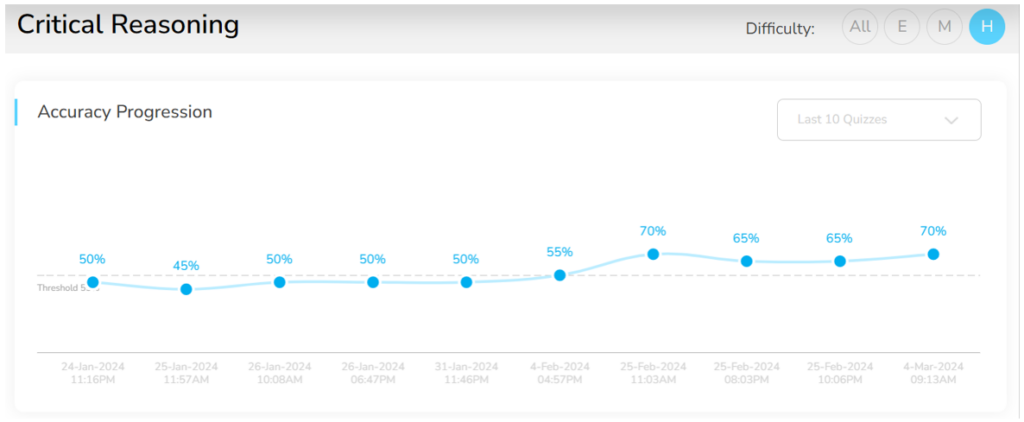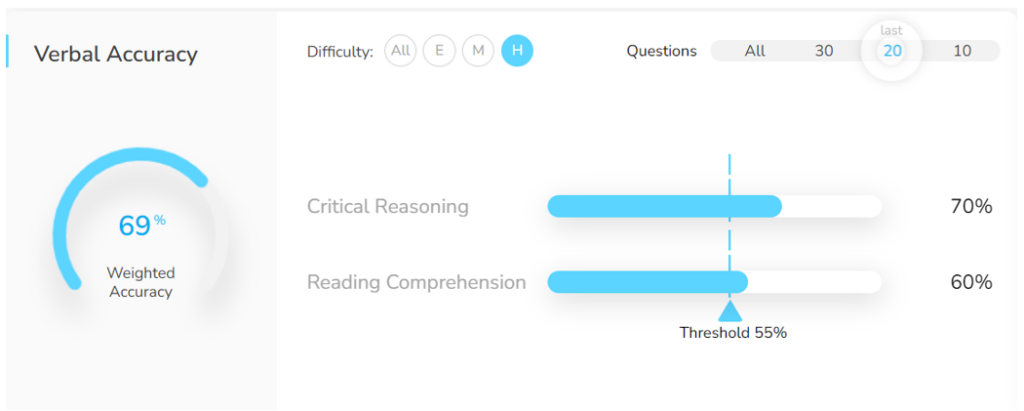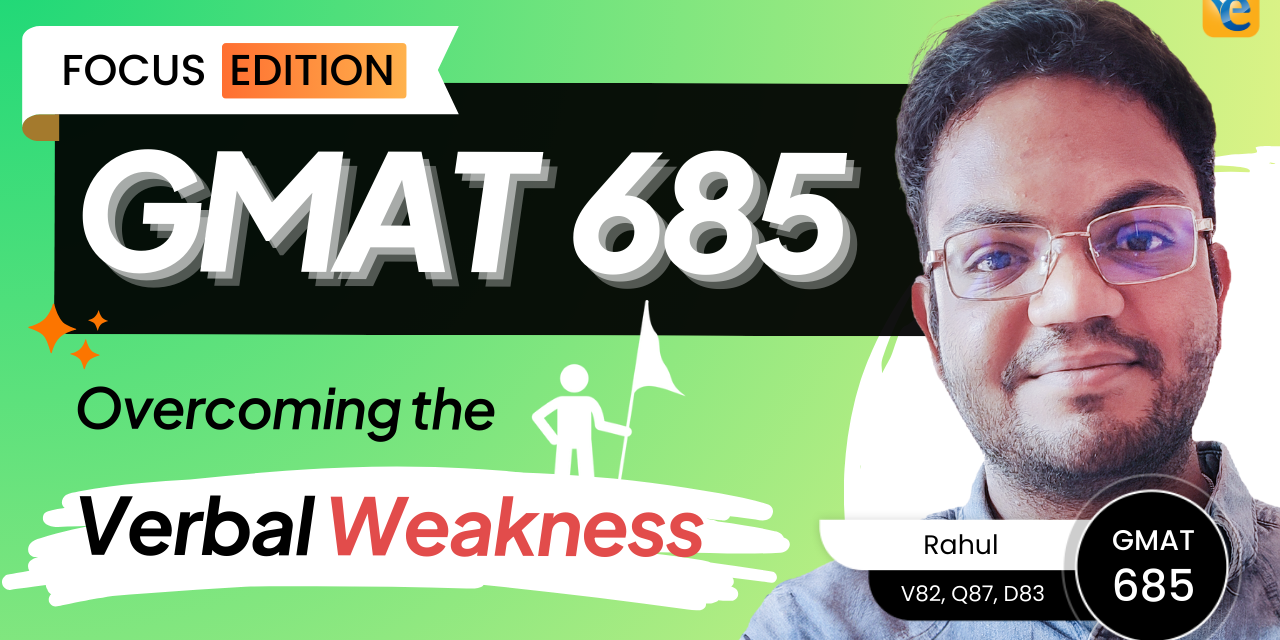Introduction
Embarking on the journey towards conquering the GMAT Focus Edition, particularly the daunting Verbal section, can feel like an uphill battle for many. Rahul’s story is a testament to the transformative power of targeted preparation and strategic learning. With a remarkable journey from grappling with the complexities of Critical Reasoning (CR) and Reading Comprehension to achieving a sensational GMAT Focus score of 685, landing him in the 97th percentile, with a stellar V82, Rahul’s narrative offers more than just inspiration; it provides a blueprint for success.
Initially, Rahul’s accuracy in hard CR questions hovered around 50%, a figure that significantly improved to a 70% consistency, marking his entry into the 90th percentile echelon of test-takers. Notably, in the challenging domain of Boldface questions, Rahul’s accuracy surged from 18% to an impressive 71%, illustrating a near-flawless performance in the final stretch of his preparation. This article has been crafted for aspirants who find the Verbal section, particularly the CR component, to be their Achilles’ heel. By showcasing Rahul’s strategic approach and the tangible outcomes of his dedication – including specific statistics that underscore his improvement – it aims to motivate and guide you towards harnessing your potential and navigating the GMAT with confidence and precision.
Join us as we explore Rahul’s journey and uncover the keys to turning verbal weaknesses into strengths, paving your way to a top-tier GMAT score.
The Verbal Challenge
Rahul’s biggest hurdle, in getting to the impressive 685, or 97th percentile, was to overcome the Verbal Section. His initial struggle with verbal was multifaceted, grappling with understanding question types and identifying patterns in questions, and lacking a structured approach to tackle them despite a previous 710 on the GCE. The following sections narrate his steps towards overcoming these hurdles and excelling.
The Master Comprehension Course Benefit
Doing e-GMAT’s Master Comprehension course was a turning point for Rahul. Guided by his mentor Rashmi, he realized the foundational importance of mastering reading and comprehension skills, pivotal for critical reasoning, reading comprehension, and data insights sections. Master comprehension teaches you how to understand sentences in the least amount of time possible. Afterall, every second is precious in the exam. The pre-recorded sessions and exercises were very useful.
“This module teaches students how to read and comprehend sentences and passages the right way. This skill lies at the root of sections such as Critical Reasoning, Reading Comprehension, and even Data Insights.” (Rahul)
Excellence in Critical Reasoning
Rahul felt he had a relatively stronger foothold in CR, where he initially fared better. However, he lacked proficiency in inference and assumption questions, especially in hard questions. He overcame these weaknesses by adopting the pre-thinking method, markedly improving his CR accuracy, especially in bold face questions. In CR, Rahul started at a 50% accuracy in hard questions, but by the time he was done with the course, he was scoring 70% accuracy consistently in Hard level quizzes – an undeniable 90th percentile ability.

In Boldface questions, he went from an 18% accuracy to a 71% accuracy, making almost no mistakes in the last 20 questions or so, as shown below.

This brought his overall weighted accuracy in CR up 70%, as shown below:

“Everyone who solves CR does a certain amount of thinking. But what I liked the most at e-GMAT was the emphasis on pre-thinking before every single question and the step-by-step approach to pre-thinking correctly.” (Rahul)
Reading Comprehension Strategies
RC presented its set of challenges, which Rahul tackled by applying active reading strategies learned from the RC modules. Understanding patterns in question types and actively engaging with passages were key to his improvement.
“What I found most useful when I started the RC modules was that the patterns for every question type were right there – how should one be reading the passage, how to tackle a science passage, etc.” (Rahul)
After going through the modules, he was able to capture the essence of the author. According to Rahul, understanding the author’s view should enable anyone to answer about 70% of RC questions correctly. Rahul also worked on keeping tabs on what the author was NOT saying. His consistently high grades in the learning levels of his RC module stand testimony to his diligence in completing the RC course.

Overall, Rahul found the RC module very useful, especially because, as a working professional, he was always pressed for time. The Reading Comprehension module served all the important lessons on a platter, helping him utilize his time efficiently and effectively.

He was able to consistently score an average of 65% accuracy (80th to 85th percentile equivalent) in his last 10 hard level quizzes, as shown above; and this was across RC passages of all topics, as shown below.

Conclusion
Rahul’s journey is nothing short of inspirational. His narrative underscores the pivotal role of targeted preparation, strategic learning, and the willingness to adapt and embrace effective methodologies. Guided by his mentor Rashmi, Rahul not only improved his comprehension skills but also mastered the art of critical reasoning and reading comprehension, areas that once posed significant challenges for him.
Rahul’s story is a powerful reminder that overcoming weaknesses in the GMAT verbal section is entirely achievable with the right tools, guidance, and mindset. It serves as a beacon of hope and a strategic guide for future aspirants who may find themselves in a similar position, daunted by the verbal challenges of the GMAT. We thank Rahul for not only sharing his journey with us but also inspiring us to believe in the possibility of transformation and excellence. We wish him the best for the exciting journey ahead!















